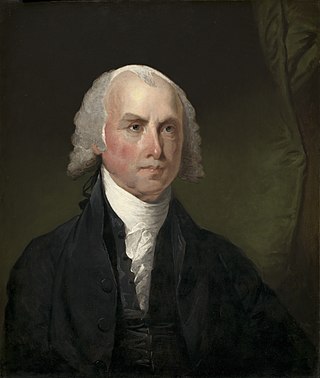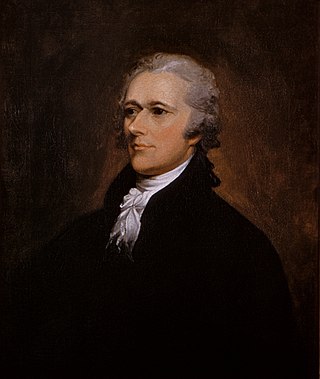
The Federalist Papers is a collection of 85 articles and essays written by Alexander Hamilton, James Madison, and John Jay under the collective pseudonym "Publius" to promote the ratification of the Constitution of the United States. The collection was commonly known as The Federalist until the name The Federalist Papers emerged in the 20th century.

Federalism in the United States is the constitutional division of power between U.S. state governments and the federal government of the United States. Since the founding of the country, and particularly with the end of the American Civil War, power shifted away from the states and toward the national government. The progression of federalism includes dual, cooperative, and new federalism.

Federalist No. 23 is an essay by Alexander Hamilton, the twenty-third of The Federalist Papers. It was first published by The New York Packet on December 18, 1787 under the pseudonym Publius, the name under which all The Federalist papers were published. One of the more significant essays in the series, No. 23 attempts to justify the increased strength of the federal government under the proposed United States Constitution, compared to the then-active Articles of Confederation. The paper is entitled "The Necessity of a Government as Energetic as the One Proposed to the Preservation of the Union".

Federalist No. 39, titled "The conformity of the Plan to Republican Principles", is an essay by James Madison, the thirty-ninth of The Federalist Papers, published on January 16, 1788. Madison defines a republican form of government, and he also considers whether the nation is federal or national: a confederacy, or consolidation of states.

Federalist No. 1 is an essay by Alexander Hamilton, which became the first of a collection of essays named The Federalist Papers. It was published on October 27, 1787, under the pseudonym Publius. This paper provides the outline for the rest and arguments for the inadequacy of the Articles of Confederation.

Federalist No. 6 is a political essay written by Alexander Hamilton, writing under the pseudonym of Publius, as did James Madison and John Jay in the other Federalist Papers. Published first in The Independent Journal on November 14, 1787, this essay argues for the benefits of a union between the American states. Formally titled "Concerning Dangers from Dissensions Between the States", Federalist No. 6 continues to discuss that the States would devolve into conflict with each other. This discussion is a bastion of Federalist thought in their fight against the Anti-Federalists.

Federalist No. 14 is an essay by James Madison titled "Objections to the Proposed Constitution From Extent of Territory Answered". This essay is the fourteenth of The Federalist Papers. It was first published in The New York Packet on November 30, 1787 under the pseudonym Publius, the name under which all The Federalist papers were published. It addresses a major objection of the Anti-Federalists to the proposed United States Constitution: that the sheer size of the United States would make it impossible to govern justly as a single country. Madison touched on this issue in Federalist No. 10 and returns to it in this essay.

Federalist No. 16, titled "The Same Subject Continued: The Insufficiency of the Present Confederation to Preserve the Union", is an essay by Alexander Hamilton. It is one of the eighty-five articles collected in the document The Federalist Papers. The entire collection of papers was written by Alexander Hamilton, James Madison, and John Jay. Federalist Paper No. 16 was first published on December 4, 1787 by The New York Packet under the pseudonym Publius. According to James Madison, "the immediate object of them was to vindicate and recommend the new Constitution to the State of [New York] whose ratification of the instrument, was doubtful, as well as important". In addition, the articles were written and addressed "To the People of New York".

Federalist No. 17 is an essay by Alexander Hamilton, the seventeenth of The Federalist Papers. It was first published by The Independent Journal on December 5, 1787, under the pseudonym Publius, the name under which all The Federalist papers were published. No. 17 addresses the failures of the Articles of Confederation to satisfactorily govern the United States; it is the third of six essays on this topic. It is titled "The Same Subject Continued: The Insufficiency of the Present Confederation to Preserve the Union".

Federalist No. 21, written by Alexander Hamilton, highlights the defects in the Articles of Confederation. It was first published by The Independent Journal on December 12, 1787 under the pseudonym Publius, the name under which all The Federalist papers were published. It is titled "Other Defects of the Present Confederation", and explains how the Articles of Confederation failed in 3 ways: by not giving the government enough power to enforce its laws, that the states do not have a guarantee of their rights, and how the states can simply ignore the tax quotas set by the government.

Federalist No. 22 is an essay by Alexander Hamilton, the twenty-second of The Federalist Papers. It was first published by The New York Packet on December 14, 1787, under the pseudonym "Publius", the name under which all The Federalist papers were published. This essay continues with a theme started in Federalist No. 21. It is titled "The Same Subject Continued: Other Defects of the Present Confederation".

Federalist Paper No. 29 is an essay by Alexander Hamilton, the twenty-ninth of The Federalist Papers. It was first published in The Independent Journal on January 9, 1788 under the pseudonym Publius, the name under which all The Federalist papers were published. It is titled "Concerning the Militia". Unlike the rest of the Federalist Papers, which were published more or less in order, No. 29 did not appear until after Federalist No. 36.

Federalist No. 30 is an essay by Alexander Hamilton, the thirtieth of The Federalist Papers. It was first published in the New York Packet on December 28, 1787, under the pseudonym Publius, the name under which all The Federalist papers were published. This is the first of seven essays by Hamilton on the then-controversial issue of taxation. It is titled "Concerning the General Power of Taxation".

Federalist Paper No. 54 is an essay by James Madison, the fifty-fourth of The Federalist Papers. It was published on February 12, 1788 under the pseudonym Publius, the name under which all The Federalist papers were published.

Federalist No. 66 is an essay by Alexander Hamilton, the sixty-sixth of The Federalist Papers. It was published on March 8, 1788, under the pseudonym Publius, the name under which all The Federalist papers were published. The title is "Objections to the Power of the Senate To Set as a Court for Impeachments Further Considered".

Federalist No. 70, titled "The Executive Department Further Considered", is an essay written by Alexander Hamilton arguing for a single, robust executive provided for in the United States Constitution. It was originally published on March 15, 1788, in The New York Packet under the pseudonym Publius as part of The Federalist Papers and as the fourth in Hamilton's series of eleven essays discussing executive power.

Federalist No. 76, written by Alexander Hamilton, was published on April 1, 1788. The Federalist Papers are a series of eighty-five essays written to urge the ratification of the United States Constitution. These letters were written by Alexander Hamilton, James Madison, and John Jay under the name of Publius in the late 1780s. This paper discusses the arrangement of the power of appointment and the system of checks and balances. The title is "The Appointing Power of the Executive", and is the tenth in a series of 11 essays discussing the powers and limitations of the Executive branch. There are three options for entrusting power: a single individual, a select congregation, or an individual with the unanimity of the assembly. Hamilton supported bestowing the president with the nominating power but the ratifying power would be granted to the senate in order to have a process with the least bias.

Federalist No. 80 is an essay by Alexander Hamilton, the eightieth of The Federalist Papers. It was published on June 21, 1788 under the pseudonym Publius, the name under which all The Federalist papers were published. It is titled "The Powers of the Judiciary", and it is the third in a series of six essays discussing the powers and limitations of the judicial branch.

Federalist No. 81 is an essay by Alexander Hamilton, the eighty-first of The Federalist Papers. It was published on June 25 and 28, 1788 under the pseudonym Publius, the name under which all The Federalist papers were published. The title is "The Judiciary Continued, and the Distribution of the Judicial Authority", and it is the fourth in a series of six essays discussing the powers and limitations of the Judicial branch.

Federalist No. 85 is an essay by Alexander Hamilton, the eighty-fifth and last of The Federalist Papers. It was published on August 13 and 16, 1788, under the pseudonym Publius, the name under which all The Federalist papers were published. The title is "Concluding Remarks".





